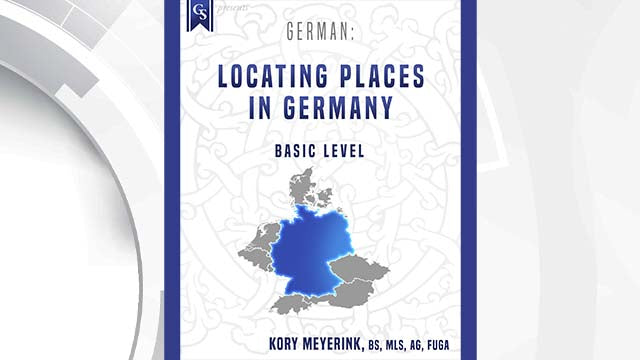GenealogicalStudies
Course Enrollment: GR-103 German: Locating Places in Germany
Course Enrollment: GR-103 German: Locating Places in Germany
Couldn't load pickup availability
Optional Print Course Material: German: Locating Places in Germany
*Course material will only be sent to students who are registered in the course.
All genealogical research is ultimately local in origin. Our ancestors lived in specific places, and the records about them were usually created in those places where they lived. Even records of larger jurisdictions, such as at the national level (e.g., census records), were generally written by officials in the specific place where a family lived. Further, it is through a family's location that we, in part, identify them. Not only is it important to know a person's name, birth date and relationships (parents, spouse, children), but also the place where a person lived (or was born, married, or died). All of these elements are necessary to fully, and uniquely, identify a person.
The geographic aspect of genealogical research is even more important for Germanic ancestors than it is for research in other areas. Some key records for family history research in countries outside of Germany were created at the state, provincial, or national level (such as military or census records). That is seldom the case with German ancestors. Virtually all the key records about German families were created at the local level, in the town or parish where they lived. A few were created at the district (like a county) level, but virtually none at higher government jurisdictions. Therefore, locating places in Germany is an important aspect of successful German research. For researchers, this begins with learning the correct place where a German immigrant came from; his ancestral home. From there it is essential to learn the parish where the family attended church. As research progresses, you may find persons married into families from other areas. Those locations must also be identified, so that appropriate records can be searched. The primary tools for such research are gazetteers. They will be the focus of this course. However, important aspects of German jurisdictions are also necessary to understand, as is the ability to read, and understand, place names which may not be familiar to an English or French-speaking researcher.
Course Length: 7 weeks
Materials
Materials
Shipping & Returns
Shipping & Returns
Dimensions
Dimensions
Share


IIGS School T-shirts
Enjoy sharing your school with others. Great conversation starter to help preserve family history for all! Soft fabric, many sizes.
